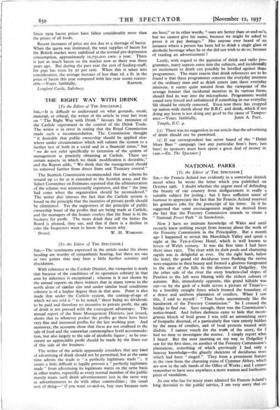[To the Editor of THE SPECTATOR.]
Sta,—The sentiments expressed in the article under the above heading are worthy of sympathetic hearing, but there are one or two points that may bear a little further scrutiny and elucidation.
With reference to the Carlisle District, the viewpoint is mace that because of the conditions of its operation sobriety in that area by inference is exceptional ; whereas is it not shown by the annual reports on these matters that in many towns in the north alone of similar size and under similar local conditions sobriety is of a higher degree than in that area. Point is also made that under the Carlisle system, the coming-of-age of which we are told is "to be noted," there being no- dividends to be paid and therefore no incentive to private profit, the sale of drink is not pressed with the consequent advantages. The annual report of the State Management Districts, just issued, shows that to whatever pocket the profits go there have been very fine and increased profits for the lait working year. And moreover, the accounts show that these are not confined to the sale of food and the somewhat commonplace hotel accommoda- tion, but also largely to the sale of alcoholic liquor ; to be con- sistent no appreciable profit should be made by the State out of this side of the busineis.
The writer of the article apparently considers that any kind of advertising of drink should not be permitted, but at the same time admits the trade is " a perfectly legitimate trade " ; it seems a little difficult to legally prevent a " perfectly legitimate trade " from advertising its legitimate wares on the same basis as other trades, especially as every normal member of the public merely treats such drink advertisements just in the same way as advertisements to do with other commodities ; the usual sort of thing—" if you want so-arid-so, buy ours because ours are best?" or-in other words," ours-are better-than so-and-so's, but we cannot- give his name, because we might be asked to prove it or pay damages." Has anyone ever heard of . an instance where a person has been led to drink a single glass of alcoholic beverage when he or she did not wish to do so, because of reading an advertisement ?
Lastly, with regard to the question of drink and radio Pro- .... grammes, many aspects enter into the subjects, and 'incidentally no incitement to drink can possibly be leVelled against these programmes. The main reason that drink references are to be found is that these programmes concern the everyday interests of the ordinary man and as drink enters into these everyday interests, it seems quite natural from the viewpoint of the average listener that incidental mention in its various forms should find its way into the microphone. Programmes would sound very forced and unbalanced if something in our everyday life should be strictly censored. Even now there has cropped up nation-wide rnirth about the B.B.C. and drink, which if not doing any harm is not doing any goad to the cause of Temper- ance.—Yours faithfully, JOHN A. PACE. Temple, E.G. 4.
[(r) There was no suggestion in our article that the advertising of drink should not be permitted.
(2) If our correspondent has never heard of the " Drink More Beer " campaign (not any particular firm's beer, just beer) its sponsors must have spent a great deal of money in vain.—En. The Spectator.]














































 Previous page
Previous page